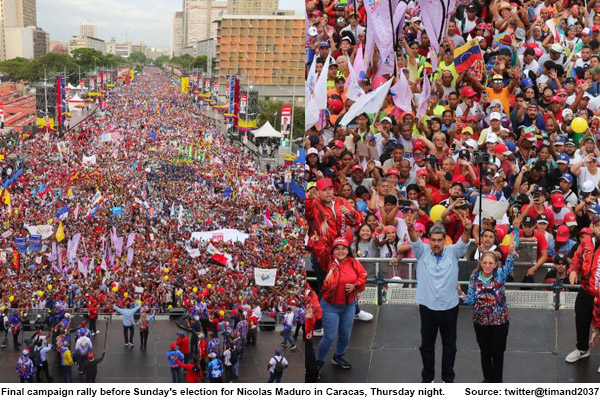Venezuela election 2024: This Sunday, Venezuelans will vote in a crucial presidential election that could result in either a major political shift or the continuation of the policies that have been blamed for the drastic economic slump in the nation.
The results of the election will have an impact on the Americas regardless of who wins—retired diplomat Edmundo González or incumbent President Nicolás Maduro. If Maduro wins another term, both critics and supporters are thinking about leaving the nation to join the millions of people who have already left, according to AP.
Around 17 million people are thought to be eligible to vote, and polling places opened at six in the morning local time.
The election on Sunday was set by the authorities to fall on the 70th birthday of former president Hugo Chávez, a Marxist figure who died in 2013 from cancer. After Chávez’s passing, incumbent president Nicolás Maduro is in charge of carrying out his Bolivarian revolution.
❗️🔥🇻🇪 – Recent images from Maracaibo show María Corina Machado and Edmundo González Urrutia in a tense atmosphere ahead of Venezuela’s upcoming elections.
Demonstrators have even displayed a mock coffin of current president Nicolás Maduro in the streets.
As the election… pic.twitter.com/2jyQnpcHVk
— 🔥🗞The Informant (@theinformant_x) July 23, 2024
Nonetheless, people are finding Maduro and his United Socialist Party of Venezuela to be incredibly unpopular. Many hold him accountable for the disastrous effects of his policies, which include falling incomes, widespread starvation, the demise of the oil sector, and the severing of families as a result of mass emigration.
For the first time in many years, a cohesive opposition is facing 61-year-old Maduro. After suffering from internal conflicts and election boycotts that hindered their earlier attempts to threaten the ruling party’s hold on power, the opposition has united around a single candidate.
González was selected in April as a last-minute substitute for Maria Corina Machado, and as per the AP, he is currently running as the candidate for a coalition of opposition parties. The Supreme Tribunal of Justice, which is under Maduro’s control, banned opposition leader Machado from standing for office for a term of fifteen years.
Former lawmaker Maria Corina Machado won the opposition’s October primary handily, receiving over 90% of the vote. But she was barred from running for president after the Supreme Tribunal of Justice, which Maduro controlled, prohibited her. She tried to replace herself on the ballot with a college professor in retaliation, but her registration was also rejected by the National Electoral Council. As a result, Edmundo González—a relative unknown in politics—was chosen as her replacement.
Venezuela used to have the most developed economy in Latin America and is home to the greatest proven oil reserves in the world. But after Maduro took over, it started to collapse. Mass emigration followed social turmoil as a result of plummeting oil prices, extensive shortages, and hyperinflation that reached over 130%. The crisis was made worse by US President Donald Trump’s administration’s sanctions intended to remove Maduro from office following his illegitimate reelection in 2018 which was denounced as such by the US and numerous other nations.
Maduro has been traveling over Venezuela in the last few days, opening roads and hospital wards as well as going to remote areas he had not gone to in a long time. His platform for the election places a strong emphasis on economic security, including tales of entrepreneurial success and citing accomplishments like stable exchange rates and lower inflation. Following the pandemic, there has been a rebound of business activity in the capital city of Caracas, which has helped the economy recover. According to IMF projections, Venezuela’s economy will expand at one of the quickest rates in Latin America this year, with growth of 4%. This follows a notable 71% economic loss that the nation underwent from 2012 to 2020.
The majority of Venezuelans’ quality of living hasn’t improved much, though. Many people make less than $200 a month, which is not enough to pay for their needs. Because of this, families frequently find it difficult to pay for necessities, which forces some people to take on second or even third jobs to make ends meet. A month’s worth of basic basics for a household of four is estimated to cost roughly $385 in a basket. Venezuelans have given up using their national currency, the bolivar, because of its volatility throughout the crisis and have become more and more dependent on the US dollar. These stark differences and the population’s economic struggles have been exploited by the opposition.
(With inputs from Agencies)

